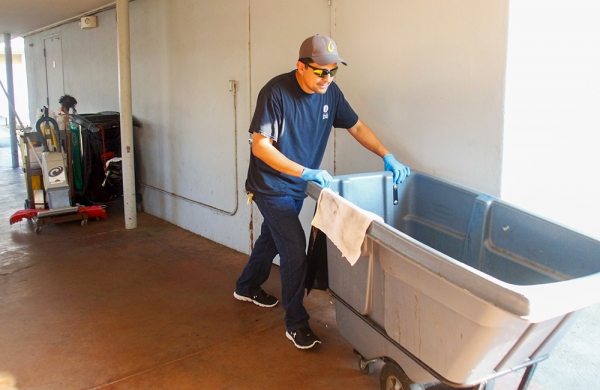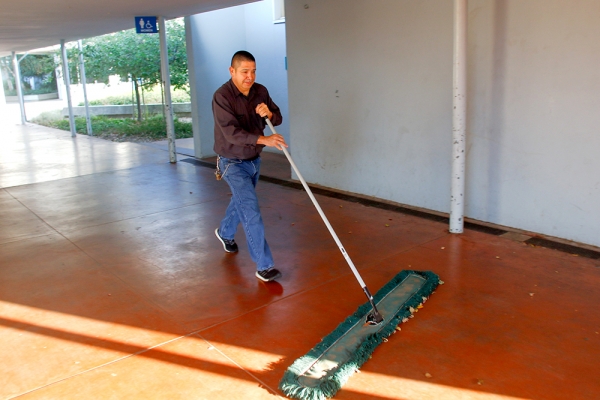Palo Alto's commitment to fair wages will face its first real test Monday night, when the City Council considers a new janitorial contract that will more than double the cost of keeping City Hall and other public buildings clean.
The proposed five-year contract with the firm SWA Services Group would cost the city about $1.9 million in the first year, which according to a Public Works Department report represents an increase of about $1.2 million in 2018 alone over the current provider. In subsequent years, the city would pay between $1.96 million and $2.15 million for the service.
If the council approves the contract, the firm would take over the city's janitorial operations on Sept. 1, immediately after the existing contract with the firm ABM expires on Aug. 31. ABM made clear that it is not willing to work beyond that date.
City staff chose SWA over two other firms despite the fact that the price tag was 30 percent above staff's estimates and about $2.2 million higher than the lowest bidder over the five-year term of the contract.
Wages appear to be the main factor driving the differences in the proposals — a subject of much discussion over the past two years as the council sought to set a higher minimum wage in Palo Alto. SWA proposes to pay the 33 contract employees a minimum of $15 per hour in the first year of the contract; the lowest bidder, Uniserve Facilities Services Corporation, was proposing an initial wage of $12 per hour, with an increase to $13.50 in January and $15 by Jan. 2, 2019, when the rate becomes the city's minimum wage.
SWA's contract entitles its employees to health benefits, vacations and holidays, while the Uniserve contract does not. Most janitors would start with a $15-per-hour wage, with lead janitors earning $18 per hour and utility worker employees making $17 per hour. Every employee would get a 3 percent raise in each subsequent year.
SWA's proposed wages are comparable to what other public agencies pay to their contract janitors, said Mike Wong, facilities manager with the Public Works Department. The company generally pays its employees $15 to $16 per hour but chose the $15 rate to keep its bid more competitive for the city, Wong said in an email.
Aside from Uniserve and SWA, the only other bidder was the firm Impec, which proposed a $12.7 million deal — about $2.5 million higher than SWA's — and would have paid employees $12 per hour in the contract's first year.
For Palo Alto, the janitorial contract will represent a sweeping change in more ways than one. The city has been contracting out its janitorial services since 1994 and the price tag has always been the main criterion during the bidding process, according to the Public Works report.
The results, according to the report, have been less than stellar. Janitors have reportedly struggled to meet the city's performance standards, which in turn required staff to intensely manage contracts and take corrective actions. Issues included supply and material shortages, prohibited activities occurring on city property, cleaning not done and poor work performance, the report states.
"When striving for the lowest cost, the city saw gaps in sufficient staffing including adequate supervision, significantly low wage rates impacting recruitment (including the ability to pass Department of Justice background checks) and retention of staff, and insufficient supplies and materials," the report states. "All of these have led to cleaning issues throughout the city."
The report also notes that other agencies have faced challenges of subpar performance similar to Palo Alto's when giving preference to cost.
The biggest factor in the city's evaluation criteria this time around is a category called "quality, performance and effectiveness of services to be provided," which comprises 40 percent of the score. Cost makes up 20 percent. Other factors, with less weight, relate to the contractor's experience, ability to provide future maintenance and financial stability.
Based on these criteria, staff unanimously selected SWA, which also provides services to the City of Mountain View.
The new janitorial contract is also notable for another reason: For the first time since the Palo Alto council launched its quest for a higher minimum wage in early 2015, the policy is taking a significant bite out of the city's bottom line.
When the council approved on Sept. 26 its current plan to phase in $15 per hour citywide, the bulk of the debate swirled around the costs to businesses, whether the city should pursue exemptions for restaurants' tipped workers (the council opted not to) and whether the $15 wage should debut in 2018 or 2019.
While the council ultimately settled on 2019, the city staff's recommendation makes a case for immediately walking the talk when it comes to janitorial services.
The move is likely to please current and former council members who initiated the drive toward the higher minimum wage. Councilmen Tom DuBois and Cory Wolbach and former members Pat Burt and Marc Berman (who is now in the state Assembly member) wrote in a February 2015 memo that low-paid workers "perform valued services in Palo Alto and often have to work multiple jobs with long commutes to barely make ends meet."
"A local minimum wage would be a modest step in supporting these workers who are vital to maintaining the services we value and that are essential to our local economy," the memo stated.
After numerous committee hearings, the council voted unanimously last September to approving the higher wage. Wolbach and Berman argued that the city should move faster on the issue and proposed going to a $15 wage by July 1, 2018. That proposal was rejected by the majority, who favored a schedule that is aligned with those of other cities in the region.
The proposed contract with SWA would cost the city $10.65 million, which includes $10.1 million for basic services and $507,268 for additional services, which includes special events, emergencies and new services. It covers 43 municipal buildings, including City Hall, libraries, park restrooms and parking garages. Among other services, the work will include floor waxing and window washing.




Comments
Another Palo Alto neighborhood
on Aug 11, 2017 at 12:36 pm
on Aug 11, 2017 at 12:36 pm
the service industry wages need to adjust to the cost of living here. perhaps, the city may want to consider hiring robots for cheaper labor.
Another Palo Alto neighborhood
on Aug 11, 2017 at 5:47 pm
on Aug 11, 2017 at 5:47 pm
Wonder how long it will take before the Social Justice Warriors will be demanding $20+ an hour, as well as health and pension benefits for these non-employees?
Charleston Gardens
on Aug 11, 2017 at 6:30 pm
on Aug 11, 2017 at 6:30 pm
@ $ 20 an hour, after taxes there is not enough money to live in Los Banos and commute. Just in case you were wondering.
Sorry 1957 was 6o years ago... Just in case you were wondering some more.
Charleston Gardens
on Aug 11, 2017 at 6:35 pm
on Aug 11, 2017 at 6:35 pm
I wonder how much of that $10,000,000 actually goes into the people that are actually doing the work? That is the question.
Crescent Park
on Aug 12, 2017 at 1:35 pm
on Aug 12, 2017 at 1:35 pm
The janitorial contract will probably pass because the money isn't coming out of the City Council member's pockets...just the dupes who pay property/sales taxes, many of whom never or rarely venture into City Hall.
Downtown North
on Aug 13, 2017 at 10:32 pm
on Aug 13, 2017 at 10:32 pm
"... the money isn't coming out of the City Council member's pockets...just the dupes who pay property/sales taxes, ..."
Last I looked, PA councilmembers must be residents. They pay taxes.
Another Palo Alto neighborhood
on Aug 14, 2017 at 9:12 am
on Aug 14, 2017 at 9:12 am
Robots can't come soon enough.
another community
on Oct 15, 2017 at 7:47 pm
on Oct 15, 2017 at 7:47 pm
Janitor compensation ? That's peanuts.
If Palo Alto's Taxpayers knew the TRUE per-hour-worked cost including wages, pensions (valued not under the ultra-liberal methodology employed by Public Sector Plans, but using the SAME assumptions & methodology that the US Gov't requires in PRIVATE Sector Plan valuations) current healthcare subsidies, and the annual cost associated with providing retiree healthcare benefits for it SAFETY workers........... they would like have a FIT ....... because it is without doubt very close to $150 PER HOUR.